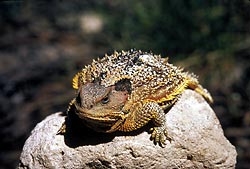 Evolution
Evolution
Of Evolutionary Biologists and Horned Lizards
In response to my post on the squishiness of the term “evolution,” evolutionary biologist Larry Moran wrote:
It doesn’t take a lot of effort to recognize what evolutionary biologists mean when they use the word “evolution.”
Sure. If I talk to a particular evolutionary biologist about evolution, I’ll probably figure out what that evolutionary biologist means by “evolution,” as I would in conversation with a non-biologist. That’s just situational awareness. However, there is no such abstract entity, no such thing as “what evolutionary biologists mean” by “evolution,” as Moran suggests.

True, Moran knows better than anyone else what he means by “evolution” on this particular occasion or that, for he alone has direct access to the private mental states that constitute his intended meaning. But Moran does not know what “evolutionary biologists” mean by “evolution.” Contrary to Moran’s unfortunate phrasing, that group of unnamed souls has neither thought nor spoken as one mind, nor could it.
Rather, each use of the term “evolution” by each writer in the field (and outside the field, for that matter) is a unique literary event that calls for interpretation, since words refuse to read themselves. Interpretation always involves reader assumptions about “authorial intent,” or the purpose for which a writer uses a term, among other things. And, of course, purpose may vary wildly from one writer and situation to the next. The grand diversity of authorial intent, as opposed to notions of univocality, will inform the careful reader’s interpretation of an encounter with “evolution.”
First Amendment theorist Stanley Fish illustrates a similar point this way:
[I]t is not true that a text’s meaning is the same whether or not its source is known. Suppose I receive an anonymous note asserting that I have been betrayed by a friend. I will not know what to make of it — is it a cruel joke, a slander, a warning, a test? But if I manage to identify the note’s author — it’s a friend or an enemy or a known gossip — I will be able to reason about its meaning because I will know what kind of person composed it and what motives that person might have had.
In the same way, if I am the recipient of a campaign message supporting a candidate or a policy, my assessment of what I am reading or hearing will depend on my knowledge of the sender. Is he, she or it an industry representative, a lobbyist, the ACLU., the Club for Growth? The identity of the speaker is part of the information and is therefore part — a large part — of the meaning. (“Consider the source” is not only commonplace advice; it is a theory of interpretation.)
So, again, there is nothing like “what evolutionary biologists mean” by “evolution.” There is instead only what individual writers mean by the word on this occasion or that, which may vary wildly. I happen to have over one hundred biology and biology-related textbooks at hand. Oh the variety of “evolution” usage across this vast body of literature! However daunting, it is the job of the reader to suss this variety out on a case-by-case basis. To instead read for the one true unified, univocal, absolute meaning of “evolution,” or of any term in any natural language, is to read a desired meaning into the text, or to go on a snipe hunt. Moran’s object of inquiry, common group intent animating uses of “evolution,” simply doesn’t exist so no amount of “effort,” as he puts it, would help us find it.

Now, why critique one bad sentence on the Internet? Because this particular sentence illustrates my earlier claim, to which Moran objected, that “evolution” can be used to serve less-than-noble purposes. Here, Moran would have us believe, mistakenly, that evolutionary biologists are of one mind on evolution, that there is a knowable consensus on what they’re talking about when in myriad various situations the word is used. Why would he want that? In a word: puffing. Nothing suggests community strength like the appearance of a large, united front.
To ward off would-be predators, the horned lizard puffs itself up when threatened to give the appearance of size. This puffing strategy is firmly embedded throughout nature, particularly in the wilds of the Internet.
